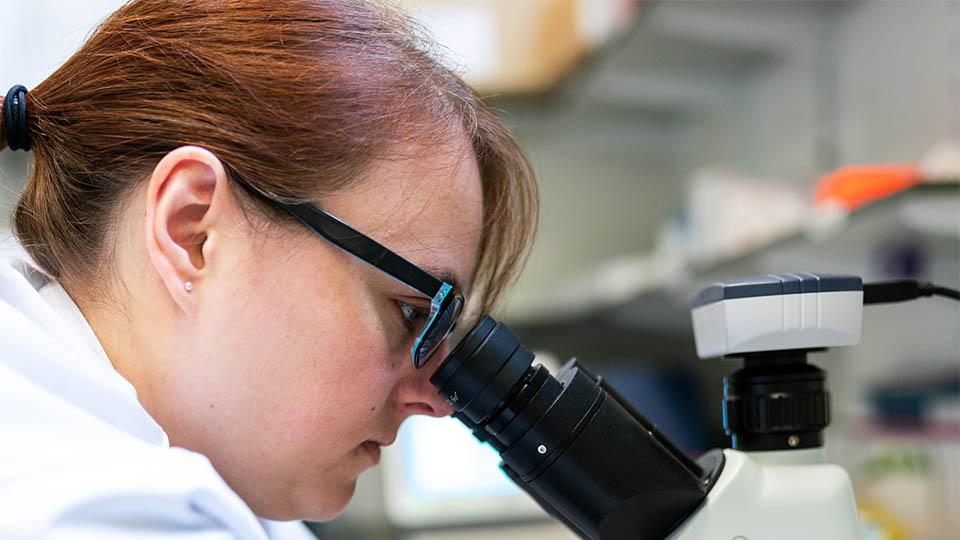- Postgraduate
- Apprenticeship
Bioinformatics Scientist

Overview
Our MSc Bioinformatics Scientist Apprenticeship is a practical industry-based course that meets the requirement for the Bioinformatics Scientist Standard ST0649.
The first 24 months of this 30-month training programme are dedicated to providing you with both academic and industrial training opportunities and supporting you to achieve the MSc in Bioinformatics and the credits you require to undertake an endpoint assessment (EPA).
After successful completion of the MSc component, you will have a further six months to undertake the EPA. This will certify you as a competent bioinformatics scientist.

Select a start date below to see relevant course information:
Start date:
Requirements
Requirements for apprentices
You would normally have a first degree (minimum 2:2) or equivalent in a life sciences/health subject or informatics/computer science.
You will be required to produce evidence that you have GCSE English and Maths (grade 9-4/A*-C) or Level 2 functional skills equivalent.
English and maths only
If you do not have evidence of maths and English qualifications that meet the Education and Skill Funding Agency requirements, you must achieve these before starting the apprenticeship.
For applicants living in London*, we have free courses-please see information here:
Open the door to new career possibilities with our free courses in Maths and English (uwl.ac.uk)
*You must be able to meet the eligibility criteria.
If you have an overseas qualification, we will check this for its UK equivalency during your application and let you know what you may need to do to meet the requirement.
For those with an education, health and care plan or a legacy statement, the apprenticeship English and Maths minimum requirement is entry Level 3 and British Sign Language qualifications are an alternative to an English qualification for whom this is their primary language.
Eligibility
All apprenticeships starting from 1 August 2021:
Eligibility is subject to Education and Skills Funding Agency (ESFA) Apprenticeship Funding Rules. Over the duration of the apprenticeship, you must meet the eligibility requirements in place at the time, including:
- Have the right to work and study in England
- Spend at least 50% of your working time in England; and
- Are a UK citizen and have been ordinarily resident for the last three years in the UK or meet one of the following immigration statuses:
UK and Irish Nationals: have been ordinarily resident in the UK or EEA for the three years before the first day of the start of the apprenticeship.
EEA nationals: have either pre-settled or settled status under the EU Settlement Scheme; and have been ordinarily resident in the EEA, Gibraltar, or the UK for at least the previous three years before the first day of the start of the apprenticeship.
*Non-EEA nationals: you are eligible if you have permission from the UK government to live in the UK, (not for educational purposes) and have been ordinarily resident in the UK for at least the previous three years before the first day of the start of the apprenticeship.
* You must meet the UK government’s eligibility criteria for apprenticeship funding:
Where an applicant for an apprenticeship does not hold a UK passport as a British citizen, these requirements state that you must have an immigration permission in the UK that allows you to study and will cover the length of the whole apprenticeship in full without you needing to extend your visa or immigration permission during the apprenticeship.
Please check the guidance for further clarification, particularly for information on:
- Family members of UK and EEA nationals
- Individuals with certain types of immigration status and their family members
- Asylum seekers
- Other immigration status.
You can also contact the Student Admissions Team admissions@uwl.ac.uk if you require further clarification.
Course detail & modules
The Bioinformatics Scientist Apprenticeship (BSA) programme is 30 months long, involving a 24 months training period, during which you will spend at least 20% of your time in 'off the job' training to achieve 180 credits at Level 7. This is followed by a six months EPA period (Figure 2) to achieve the MSc Bioinformatics degree and Bioinformatics Scientist Apprenticeship Certificate.
The course is structured to progressively up-skill your knowledge, skills and behaviours to reach competence as a bioinformatics scientist.
In year one, you will complete 80 credits. In year two, you will complete 100 credits, consisting of two taught modules (20 credits each) and a supervised project (60 credits). The project will be undertaken at your employer’s workplace to consolidate your learning, improve on skills, occupational behaviours and competence in preparation for the EPA.
Over the 24-month period preceding the six month EPA period, in addition to the 180 credits at Level 7, you will also complete your Vocational Competency Evaluation log.
All students are expected to study and pass a total of 120 credits from taught modules.
Compulsory modules
-
Introduction to Genetics and Genomics
During this module you will develop an understanding of the key areas of genomics, human genetics and genetic variation. You will also examine the genomics basis of diseases and how it can be used to improve health outcomes.
-
Bioinformatics and Functional Genomics
On this module you will be introduced to basic practical sequence and structure analysis techniques, tools and resources. You will also develop a strong foundation in 'omics and NGS analyses. There will be opportunities for you to apply bioinformatics and computational analysis to problem-solving in real healthcare or industry scenarios.
-
Data Science for Bioinformatics
On this module you will be introduced to data science in bioinformatics. You'll have opportunities to gain practical skills for programming such as Python and R. You will also be able to apply statistical and modelling techniques to explore big data, and design appropriate database and web solutions for computational biology and bioinformatics data storage, visualisation or dissemination.
-
Advanced Bioinformatics and Genome Analysis
This module will help you to develop knowledge and skills that underpin the clinical application of bioinformatics. The module will build on your genomics, bioinformatics and programming knowledge to develop an analysis strategy for a new service. There will also be opportunities for effective interdisciplinary team working.
-
Machine Learning
Machine learning is an application of artificial intelligence that provides systems with the ability to automatically learn and improve from experience without being explicitly programmed.
This module familiarises you with some basic machine learning algorithms and techniques and their applications, as well as general questions related to analysing and handling large data sets. Several software libraries and data sets publicly available will be used to illustrate the application of these algorithms. The emphasis will be thus on machine learning algorithms and applications, with some broad explanation of the underlying principles.
-
Bioinformatics Project
This module will give you the chance to demonstrate your ability to organise and carry out a major piece of work. You will gather background information and research the literature and data . You will also design and execute a research plan to solve a bioinformatics problem, and discuss existing results and present your new findings through a series of written and oral presentations.
Optional modules
-
Data Management in Healthcare (DSH)
The aim of the module is to cover some of the developments in the broad range of data-driven healthcare. The module will give you hands on experience with various types of large-scale data and information handling, and start by providing a solid understanding of the underlying technologies. The module also provides a good understanding of data structures, software development procedures and the range of analytical tools used to undertake a wide range of standard and custom analytical studies, providing data solutions to a range of healthcare issues.
-
Big Data Analytics
In this module, learners will be provided with a balanced view of the theory and practice on big data analytics, allowing them to develop a variety of big data analytics knowledge and skills. The module will enable you to gain a systematic understanding of big data and its applications, and a critical awareness of current issues for storing, managing, processing, analysing and visualising massive amounts datasets; achieve an in-depth practical understanding of big data software tools and frameworks underpinning big data analytics and visualisation; and acquire a comprehensive knowledge of statistical, mathematical and machine learning techniques, and develop the ability to critically design, implement and evaluate big data analytics modelling and applications to complex real-world problems.
-
Information Systems in Healthcare
This module provides an opportunity for you to develop an understanding of the different approaches to the specification, design and delivery of systems and be able to know when and how best to apply them in a way that is likely to results in systems delivering target benefits, fulfilling user expectations, maximising patient safety and providing value for money. The module will also consider innovations and trends in technologies in conjunction with the requirements and implementation of health information systems.
-
Policy Context of Improvement
The Policy Context of Improvement (Negotiated Work-based Learning) module provides you with theoretical and practical knowledge about the political context of improving healthcare services. It offers opportunities for you to build knowledge about the current political context; build capacity to anticipate and respond to future political and economic pressures; increase awareness and recognition of the major changes currently underway in healthcare; provide an understanding of what policy is, and how policy changes can impact an improvement project; and encourages you to creatively solve problems using improvement methods in response to economic and political pressures.
Teaching & learning

The range of teaching, learning and assessment strategies adopted on this course is intended to fulfil a number of principles, namely to:
- encourage you to develop as an independent learner
- promote an experiential approach to learning through volunteering, internship, networking and mentoring thereby providing links between learning and work
- accommodate and develop different preferred learning styles
- provide access to learning in different environments
- enable reflective practice through the use of learning logs, workbooks and learning agreements
- make our learning materials accessible to you through a variety of media
- use continuous formative assessment with a varied diet of summative assessments
- encourage you to engage in the pursuit of life-long learning
- develop higher level learning skills of analysis, synthesis and evaluation.

Our approaches include:
- lectures
- hands-on practical work
- whole group information-giving sessions
- workshops
- tutorials
- case studies
- blended e-learning
- group critiques.
As would be expected at masters’ level, there is an appropriate balance of theory and practice. In order to be successful you will need to demonstrate high levels of analytical, critical and reflective skills alongside a professional level of practical skills and knowledge. Teaching and learning on the course is underpinned by the research and scholarly activities of our experienced teaching team.
On this apprenticeship you will be encouraged to take responsibility for your own learning whilst still being supported by your subject tutors. You will be encouraged to immerse yourself in the subject area.
So you can make use of low-cost external seminars, we encourage you to apply for student membership of the British Society for Genetic Medicine (BSGM), the Royal Society of Biology (RSB) and the Chartered Institute for IT (BCS).
Study mode
As an apprentice, you'll spend 20% of your working time 'off-the-job', studying at the University.

How you will be assessed
The course assessment strategy key principles are:
- a balance between the types of assessment and the overall workload of assessments
- the equitable nature of assessments across the course
- a balance between formative and summative work
- the integration of theory and practice
- the use of experience and reflection to develop critical awareness
- the relationship of the assessment to the leaning outcomes and the form of learning and teaching that takes place within the module
- the marking will tend to use predetermined grids and assessment forms to clearly identify the features that are assessed for all students in all assessments and to meet the level 7 Higher Education descriptors.
Assessment for the MSc course is designed, where possible, to simulate the variety of tasks that graduates from the course may encounter in relevant employment. Where necessary other academic assessment devices, such as a formal examination, defence of the proposal etc. are also used. Module tutors are the assessors in the majority of cases. However, we may also use peer and self-assessment where appropriate.
Assessment types include:
- analysis and design and the production of appropriate artefacts
- portfolio of work
- workbooks
- oral presentations to tutors and peers
- viva voce
- case study reports
- synoptic reports
- technical reports
- development of design specifications
- research seminars
- critiques of own and peer work
- defence of a proposal
- written proposal
- major project
- examinations.

Endpoint Assessment
Progression points
The apprenticeship content is structured into two prospective Progression Points.
Progression Point 1
To meet requirements for Progression Point 1 (PP1), you must:
- have achieved 180 level 7 credits eligible for the MSc Bioinformatics with Bioinformatics Scientist Degree Apprenticeship award (NB: This award will be made after a successful EPA)
- present certificates for English and Maths level 2 certificates (or equivalent)
- have a completed and signed-off Vocational Competence Evaluation (VCE) log
- be certified as competent in bioinformatics practice by your employer
- have written confirmation by employer that you are ready to undertake the EPA.
When you meet all the requirements for PP1, you will advance to and prepare for Progression Point 2 (PP2).
To be eligible for PP2, you must undertake the EPA.

End Point Assessment
The EPA stage must be successfully completed within a maximum 6-month period. During this period the apprentice will undertake 3 distinct assessments:
- Complete a Post Training Synoptic Report (6000 words) together with presentation materials for discussion
- Undertake a synoptic report review, followed by
- Give an Oral Presentation and participate in a discussion (Q and A format)
- Participate in a viva-style professional conversation supported by a vocational competence evaluation log.
The presentation and professional conversation will be organised and managed by an external End Point Assessment Organisation (EPAO)
When you meet all the requirements for PP2, you will be put forward for progression to the final award stage, PP2.
Progression Point 2: Final Award – MSc Bioinformatics Scientist
To be eligible for the MSc Bioinformatics Scientist and Degree Apprenticeship award, you must successfully complete all elements of the EPA.
Costs & fees
Costs for apprentices
Although there are no tuition fees payable by you as an apprentice, additional costs may be incurred which are outside of the apprenticeship levy funding. Please discuss additional costs directly with your employer.
Costs for employers
For employers, the costs of training your apprentice will usually be covered by the apprenticeship levy. Find out more about how apprenticeship funding works.
Teaching staff

Professor Shanyu Tang
Shanyu Tang is Professor of Information Security at the University of West London, having joined academia in 2000 as a Lecturer in Informatics and Multimedia Technology in the School of Informatics and Multimedia Technology at the University of North London, United Kingdom. He is a Fellow of the British Computer Society (FBCS) and a Fellow of the Higher Education Academy (FHEA).
He is the lead/corresponding author of 106 scientific publications: 66 peer-reviewed journal papers, including IEEE/ACM Transactions, IET journals and IEEE Journal of Biomedical and Health Informatics, 38 conference papers and two books. He, as a principal investigator, is a recipient of 11 external research grants, including seven national research grants. He filed an Internet of Things security patent.
As first supervisor, he has successfully supervised to completion nine PhDs in computer science and informatics and has been involved in seven external PhD examinations. He is on editorial boards of international journals in computer science and informatics.
He was a scientific adviser to several universities and organisations, sitting on the university’s research committee from 2007 to 2017 and the IEEE Admission and Advancement Committee Panel 2011. He chaired international conferences, served on conference program committees and gave numerous invited research seminars.
His research interests include bioinformatics, health data security, secure communication and social media analytics, most notably the use of machine learning and chaos theory to these areas.
Shanyu Tang is Professor of Information Security at the University of West London, having joined academia in 2000 as a Lecturer in Informatics and Multimedia Technology in the School of Informatics and Multimedia Technology at the University of North London, United Kingdom. He is a Fellow of the British Computer Society (FBCS) and a Fellow of the Higher Education Academy (FHEA).
He is the lead/corresponding author of 106 scientific publications: 66 peer-reviewed journal papers, including IEEE/ACM Transactions, IET journals and IEEE Journal of Biomedical and Health Informatics, 38 conference papers and two books. He, as a principal investigator, is a recipient of 11 external research grants, including seven national research grants. He filed an Internet of Things security patent.
As first supervisor, he has successfully supervised to completion nine PhDs in computer science and informatics and has been involved in seven external PhD examinations. He is on editorial boards of international journals in computer science and informatics.
He was a scientific adviser to several universities and organisations, sitting on the university’s research committee from 2007 to 2017 and the IEEE Admission and Advancement Committee Panel 2011. He chaired international conferences, served on conference program committees and gave numerous invited research seminars.
His research interests include bioinformatics, health data security, secure communication and social media analytics, most notably the use of machine learning and chaos theory to these areas.
Study & career progression

The Bioinformatics Scientist degree apprenticeship option offers a great opportunity for you to study for an MSc qualification with Vocational Competency Evaluation (VCE) certification. It takes 30 months full time (including six months for the EPA) and is available to students who wish to complete this course through an apprenticeship.
This apprenticeship offers you the opportunity to study while being employed full time in a bioinformatics setting, enabling you to continue advancing your career as you gain a valuable postgraduate qualification.
Next steps
Next steps for apprentices
Apprenticeships are open to both existing and new employees.
If you would like to start an apprenticeship in your current working role, you will need to register interest with your employer.
Why not send the appropriate person at your organisation a link to our information for employers?
How to apply
To apply for this apprenticeship, you will need to find a position with an employer who is offering it. We cannot accept applications directly.
We advertise any apprenticeship vacancies from employers we are working with on our Vacancies page, and we recommend checking the National Apprenticeship Service website for vacancies across the country.
Please note that we cannot accept applications directly.
Next steps for employers
If you are interested in offering this apprenticeship, either by hiring a new apprentice or training a current employee, contact Janet Rowson, Director of Apprenticeships:
- Email janet.rowson@uwl.ac.uk
Contact us

Janet Rowson, Director of Apprenticeships
Please get in touch with Janet Rowson to find out more about working with the University of West London as a training provider.
- Email: janet.rowson@uwl.ac.uk
Please get in touch with Janet Rowson to find out more about working with the University of West London as a training provider.
- Email: janet.rowson@uwl.ac.uk
